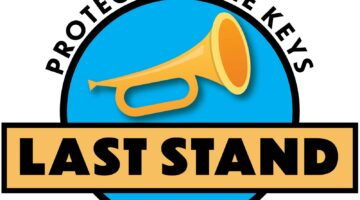Finally, Science-Based Coral Restoration Begins in Key Largo
Mote Announces Plans for New Land-Based Coral Nursery, The First One of Its Kind in Key Largo
Wednesday, March 1 – Today, Mote Marine Laboratory & Aquarium announced plans for future development to bring science-based coral reef restoration to Key Largo. A new land-based nursery, the first in Key Largo, will be built on the grounds of the Reefhouse Resort & Marina, formerly known as Key Largo Bay Marriott Beach Resort. As Key Largo’s first and only land-based coral nursery, it will host Mote’s coral, bringing first-in-class, resilience-focused restoration efforts in the Upper Keys. By expanding operations in Key Largo, Mote continues to directly respond to the urgent plight Florida’s Coral Reef is facing. Warming waters, more acidic conditions due to higher carbon emissions, a devasting coral disease and other stressors have left our once abundant, thriving reef near the brink of extinction.
This is Mote’s second satellite land-based coral nursery in the Upper Keys. The first satellite nursery, located at the famed Bud ‘N Mary’s marina in Upper Matecumbe, opened in May 2021. Land-based coral nurseries provide a more integrated reef restoration approach, as some native coral species, such as Acropora palmata (elkhorn coral), grow faster after fragmentation on land as compared to in-water fragmentation and growout. Field-based, or in-water, nurseries will also be utilized for optimized growth of other significant species used in coral restoration. Having the ability to do both land- and in-water based restoration in hybridized nurseries provides Mote a unique advantage to further it’s resilience-based restoration along Florida’s Coral Reef.
Mote, a leader in marine research and conservation since its founding in 1955, has been actively paving the way in science-based restoration efforts in the Florida Keys for over 25 years. With a growing staff of highly revered and heavily published PhDs and expert practioners, Mote is the only organization completing the entire restoration loop under one entity: from assisting sexual-reproduction cycles, to rearing the next generation of coral, to resilience testing, asexual fragmentation with scaled up outplanting and extensive monitoring. To date, Mote has outplanted over 140,000 coral fragments on Florida’s Coral Reef, with a survival rate of over 90% in most cases. Additionally, several thousand corals are growing in Mote’s land-based nurseries on Summerland Key and Islamorada, as well as Mote’s two underwater nurseries in the Lower Keys. Permits for additional underwater nurseries in the Upper Keys are currently in progress.
In addition to the Summerland Key and Islamorada campuses, Mote has two public exhibits in the Florida Keys, at NOAA’s Eco-Discovery Center in Key West and the Florida Keys History and Discovery Center located in the Islander in Islamorada. In 2021, Mote created a unique, large-scale, land-based, International Coral Gene Bank with living coral in massive recirculating seawater systems at its Marine Aquaculture Research Park (MAP) location 13 miles inland near Sarasota. With nearly 2,000 genotypes, Mote has the largest holding of living coral genetic diversity in existence, outside of Mother Nature herself. Mote’s gene bank vision began with a focus on corals endemic to Florida and U.S. jurisdictions of the Caribbean, and it is now expanding to include coral genetic diversity from reefs around the world.
Dr. Michael P. Crosby, Mote President & CEO, says, “The reefs in Key Largo, as well as the entire eco-conscious community here, deserve to have the best and brightest scientific minds, doing research to help identify the most resilient-focused restoration strategy, in the most cohesive, integrated, and novel ways possible. That’s what Mote brings to the table. Restoration outplanting is the easy part; making sure that the approach is fundamentally rooted in science, with a cohesive genetic management strategy securing successful diversity and resiliency for short and long term survival and success…that’s where Mote excels.” He adds, “This new nursery in Key Largo, at Reefhouse Resort and Marina, allows us to continue to scale up our efforts and double our operations and capacity to serve the upper regions of the reef within the Florida Keys National Marine Sanctuary.”
Mark Walsh, curator and owner of Opal Collection including Reefhouse in Key Largo, says the addition of Mote’s coral nursery is a “welcome addition and natural fit to Reefhouse Resort and Marina, the Opal Collection, and Key Largo.” He adds, “We continue to honor our commitment to the communities in the Florida Keys, and ultimately Florida’s Coral Reef, to do as much as possible to help those leading the way in science-based solutions to repair, recover, and rebuild our reef. Mote’s cohesive restoration plan offers much needed hope to our ailing reef. We stand together with and encourage other community leaders, organizations, and individuals to support Mote and their efforts throughout the Keys.”
Construction of Mote’s new land-based nursery onsite at Reefhouse begins immediately and is anticipated to be fully operational by Summer 2022. Similar in size to the Islamorada nursery at Bud ‘N Mary’s marina, this nursery will have the capacity to hold 20,000 fragments of coral at any given time. Crosby adds, “The long-term vision for the rapid restoration and revitalization of our reef is clear. This new nursery is another huge leap forward for science-based coral restoration and ecosystem rehabilitation in Key Largo where some of the worlds’ most iconic diving, fishing and ocean recreation have long been revered.”
Celebrating Mote’s Past & Present in the Keys
In 1993, Mote expanded to the Florida Keys, with its first Keys laboratory located on Pigeon Key, located in the middle of the 7-mile bridge. By 2000, Mote had moved operations into a recently vacated ‘monkey lab’ on Summerland Key. As operations and staff continued to grow, Mote realized a greater need for a facility to support its vast research and restoration goals in the Florida Keys. Indeed, in 2017, that dream became reality with the opening of the Elizabeth Moore International Center for Coral Reef Research & Restoration; a 19,000 square-foot, Category 5 hurricane-resistant building with five laboratories, a land-based nursery, a Climate and Acification Ocean Simulator, classrooms, and temporary dorm-style housing for visiting researchers from universities and organizations from around the world.
New Scientific and Community Engagement Staff
With expansion and growth of nurseries and operations, Mote has also gained several new staff members to its world-renowned and highly published team. In December, Mote welcomed Dr. Jason Spadaro as a Postdoctoral Research Fellow, specializing in the effect of herbivores on coral reef communities and restoration ecology. In early February, Dr. Jason Spadaro hatched Mote’s first clutch of Caribbean king crabs (Maguimithrax spinosissimus; commonly known as spider crabs) as part of a project funded, in part, by the National Marine Sanctuary Foundation to develop and refine aquaculture-based methods to build capacity for their production. These and successive clutches of juveniles will eventually be introduced onto Florida’s Coral Reef as part of the ongoing Mission: Iconic Reefs (M:IR) initiative led by the National Oceanic and Atmospheric Administration (NOAA) in partnership with marine science and coral restoration organizations such as Mote and other organizations. Mote is committed to resilience-based ecosystem restoration strategies that apply a science-based approach on multiple fronts, and is now, with Dr. Spadaro’s work, positioned at the forefront of mitigating algal overgrowth and seaweed dominance—both significant challenges to successful long-term coral restoration—by growing a program to bolster populations of a key reef herbivore, the Caribbean king crab.
This week, Mote welcomes Erin Muir in the newly created position of Community Engagement Manager for the Upper Keys. As the Upper Keys operations continue to expand for Mote’s restoration efforts, Muir will serve as the liaison with the local community, helping to enhance awareness and support of Mote. Erin previously served as the Membership and Events Manager at the Florida Keys History and Discovery Center, where Mote hosts an exhibit focused on Florida Coral Reef. As Mote’s Islamorada efforts continue to grow, and Key Largo efforts come online, Mote intends to meaningfully engage the local businesses, ecosystem stewards, and environment champions.
About Mote Marine Laboratory & Aquarium:
Mote Marine Laboratory & Aquarium is an independent, nonprofit, 501(c)3 research institution founded in 1955. Mote began and flourished through the passion of a single researcher, Dr. Eugenie Clark, her partnership with the community and philanthropic support, first of the Vanderbilt family and later of the William R. Mote family. Today, Mote is based in Sarasota, Florida, with six campuses stretching from Sarasota to the Florida Keys. Mote has more than 20 world-class research programs studying oceans locally to internationally, with an emphasis on conservation and sustainable use of marine resources. Mote’s vision includes positively impacting public policy through science-based outreach and education. Showcasing the Lab’s research is Mote Aquarium, open from 10 a.m. to 5 p.m. 365 days a year. mote.org
Permits:
Mote’s research and restoration activities are permitted by NOAA’s Florida Keys National Marine Sanctuary (FKNMS-2021-171 & FKNMS-2021-172) and pursuant to a Special Activity License by the Florida Fish and Wildlife Conservation Commission (SAL-22-2406-SCRP).
[livemarket market_name="KONK Life LiveMarket" limit=3 category=“” show_signup=0 show_more=0]


No Comment